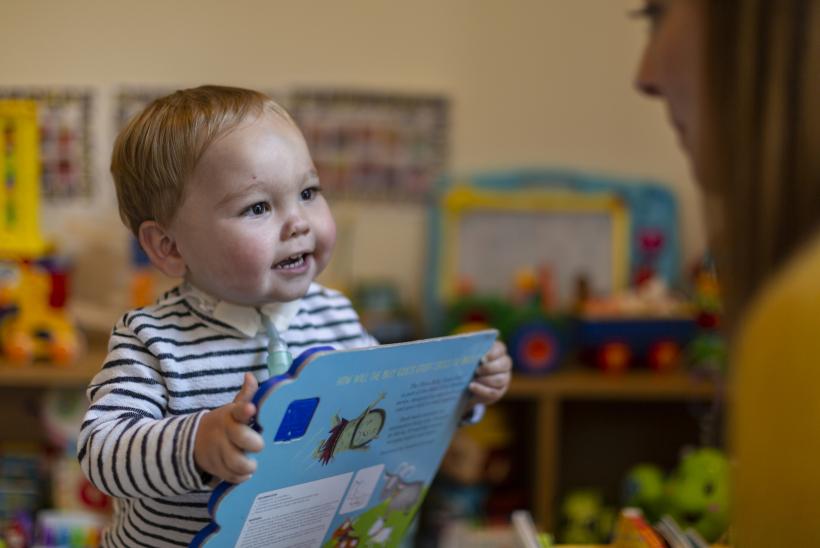GOSH多学科团队拯救先天性复杂心肺疾病的重症宝宝
Henry was born with a congenital condition as well as a hole in his heart. A few days after birth, he was also diagnosed with Long Segmented Tracheal Stenosis and Left Pulmonary Artery Sling. At five weeks old, he was transferred to Great Ormond Street Hospital for Children (GOSH) for specialist treatment by the tracheal team, who have pioneered a special surgery to help children with Henry’s condition.
“Henry was born at term but taken to a special care baby unit immediately as he had a congenital condition called imperforate anus as well as holes in the heart.” Explains his mum, Shevonne. “After a few days his breathing became irregular and he was diagnosed with Long Segmented Tracheal Stenosis and Left Pulmonary Artery Sling.”
The trachea (windpipe) is the airway tube leading from the throat to the lungs. It’s made up of a series of C-shaped rings of cartilage linking it together (like a vacuum-cleaner tubing). Tracheal stenosis means that the rings are often fixed, ‘O’ shaped, and don’t allow for growth. “Henry’s windpipe was 1.5mm wide; it should be 6-8mm.”
Henry’s pulmonary artery (the artery that carries deoxygenated blood from the right side of the heart to the lungs) was not in the right position. “His left pulmonary artery was also passing between the trachea and oesophagus, wrapping around his windpipe, and his trachea was made of complete cartilage rings, which wouldn’t have grown with him.”
“At five weeks old Henry was transferred to GOSH. My husband and I felt apprehensive as it confirmed his condition’s severity, but we were grateful he had a chance. GOSH has a specialist tracheal team that devised the slide tracheaoplasty surgery for Henry’s condition.
“Henry had this surgery in December 2017. He was critical. His left vocal cord was paralysed during the airway surgery; we didn’t know whether he would have a voice. He recovered but required 24 hours of Continuous Positive Airway Pressure (CPAP) ventilation for three months, followed by a move onto Optiflow/Vapourtherm, where he was weaned from constant ventilation.
“In this time, he had a full respiratory arrest and the team in GOSH’s Cardiac Intensive Care Unit (CICU) re-intubated him and returned him to the ventilator to make his airway safe again.
“In 2018 Henry was given airway stents – although was still unable to manage breaks from CPAP – as well as other surgery to correct his imperforate anus and a gastrostomy as he was unable to eat or drink orally. He also had a tracheostomy to secure his airway and prevent repeat intubations.
“Henry spent nine months on Flamingo Ward, home to the CICU. Once we left intensive care, I could stay with Henry on Kangaroo Ward.
“Henry is also supported by the specialist endocrine team at GOSH and had a Wellchild Long Term Ventilation Nurse, who trained us up to feel confident to manage Henry at home. The Clinical Nurse Specialist for tracheostomies also showed us how to properly care for Henry’s trachea. Physiotherapists were essential to Henry’s care too.
“During the 15 months we spent in hospital with Henry, the tracheal service co-ordinated our care with the CICU and the respiratory team. We felt completely informed and at the centre of our child’s care. The collaboration across disciplines at GOSH, and with us as parents, was phenomenal.
“Henry was discharged in January 2019 and is now 23 months old, running and exploring at every opportunity. As he is ventilated 24 hours a day my husband and I wear his ventilator like a backpack. He loves being read to, playing in water and on swings, nursery rhymes, musical instruments, drawing and blowing kisses; it was one of the first sounds he made with his lips once he was used to the tracheostomy. He also enjoys hoovering! Henry is such a happy boy, reaching milestones even after all he’s faced – we call him Heroic Henry.
“The only developmental delay Henry has is with his speech because the tracheostomy prevents him talking. But he can make vocal sounds, which is so heart-warming when we didn’t know whether he would ever be able to talk. We’ve been teaching him Makaton and he now has 40 signs he uses; we learnt about ‘Singing Hands’ at GOSH, which we all love!
“Life is exhausting but hopeful. We have a chance that Henry will grow and, as he does, some issues he currently has will become less of an issue.
“We have visited GOSH four times since returning home, having reviews from all the teams, plus regular contact with GOSH’s tracheal CNS, cardiologists and surgeons. Henry spent his first birthday and two Christmas’ at GOSH and had his christening in the GOSH chapel – many staff attended! We want to thank everyone, from the clinicians, play workers and the GOSH Arts team to domestic staff and volunteers. GOSH is a truly wonderful place and we were so lucky to have access to so many experts.”


